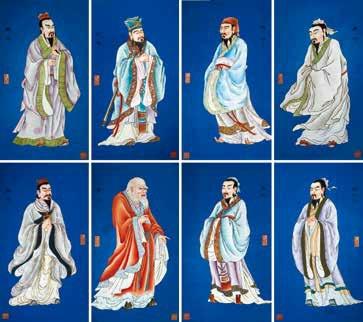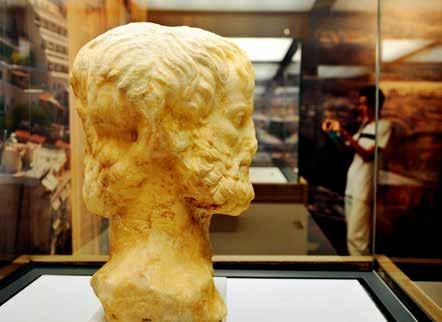Freedom vs.Order
2020-09-30byPanYue
by Pan Yue
Ancient Greek civili- zation is considered the cradle of modern Western civilizations, and Chinese civilization experienced crucial evolution around the same time during the Warring States Period (475-221 B.C.). In fact, both civilizations faced similar historical situations from 500 to 300 B.C.
Over the last five decades in the Warring States Period, strategists and advisers were divided into two factions. The Qin State inside Hangu Pass was heavy with legalists and political strategists. Opposite it, the six allies outside Hangu Pass developed a spirituality led by Xuncius, the last Confucian master of the Warring States Period, who presided over Jixia Academy for three terms.
Xuncius realized that Confucians had constructed a unified morality system but not a unified governance system, while legalists had developed a unified governance system with glaring flaws in the realms of spirituality and morality. He determined that integrating the legalist system of the Qin State with Confucian meritocracy, honesty, righteousness, and benevolence would form a Great Way.
Han Fei and Li Si, two standout students of Xuncius, both ventured into the Qin State to realize ambitions after finishing their studies. Xuncius became very disheartened by their departure and even went on a hunger strike because the students abandoned Confucianism in favor of taking Legalism to an extreme. Xuncius considered Legalism and Confucianism unified opposites which cannot exist without each other. Xuncius teachings are not limited to Confucianism and Legalism. The Records of the Grand Historian (a monumental history of ancient China by Sima Qian) declared that Xunciusphilosophy built on the successes of Confucianism, Mohism and Taoism while at the same time learning from their failures.
Xuncius philosophy embodies the tolerance and inclusiveness of Chinese civilization in the face of massive difficulties and contradictions. It pursues a “middle way” based on reason rather than dogma. In modern discourse, this would be called “seeking truth from facts.” The middle way of thinking enabled Chinese civilization to tolerate and integrate seemingly irreconcilable contradictions to create a harmonious environment featuring symbiotic coexistence of polar things.
Xuncius died at the age of 90.
His philosophy was so contradictory that his post-mortem legacy became even more marginalized. For 1,800 years after Confucianism was officially recognized, Xuncius was never acknowledged by any Confucian sect.
About 70 years after Xuncius was born, Aristotle was born in Thrace, a city-state regarded as barbarian territory under the jurisdiction of the Macedonian king. At the age of 17, he was sent to Platos Academy in Athens alone. A resident alien, he was not chosen as Platos successor even as his most successful disciple.
Aristotle left Athens for Macedonia and tutored Alexander the Great. Alexander was educated according to the highest standards of Greek civilization. Aristotle inspired the 14-year-old with Greek literature and Homers epics and kindled his passion for biology, botany, and zoology. He even wrote two monographs to cultivate Alexanders political thinking.
The conquests of Alexander the Great spread Greek culture widely. Aristotle spearheaded violent conquests to spread civilization that evolved into Western imperialism. While Alexander the Great was conquering, his revered teacher Aristotle returned to Athens and established his own school called Lyceum. The Lyceum welcomed thinkers from outside Athens and soon bested even Platos Academy in reputation.
At the Lyceum, Aristotle extensively synthesized various previous philosophies and wrote the masterwork Politics, a fundamental pillar of Western political philosophy.
Aristotle faced trial in the Ecclesia, the Athenian assembly, following Alexanders death. Devastated, he fled to Evia in Macedonia and died a year later.
The fates of these two thinkers demonstrate that every civilization and philosophical school contains contradictions. There is no universal rule or theory that can explain everything in the development of human society. Every philosopher devoted to changing reality rather than building a utopia will ultimately face a dilemma in which he cannot make a consistent choice, enabling the opposition to gain the upper hand. But this pain is consistent with the idea of mutual reinforcement. Instead of bowing to one kind of absolute law, we should dare to make the impossible possible.
Today, the greatest difference between Western and Eastern civilizations is prioritization of freedom or order, the core values of Greek civilization and Chinese civilization, respectively.
Greeces love for freedom made “Greek” synonymous with“wisdom,” while the Chinese respect for order enabled China to survive as the only country with uninterrupted civilization. Which is better: stability brought by order or innovation fueled by freedom? This question has been the center of endless debates in philosophy, politics, religion, and ethics. There is not a definitive conclusion. Tolerance for differences can lead to mutual learning and future integration of civilizations. Coexistence of diversity and contradiction plants more seeds in the gene pool of human civilization. Differences on prioritization of freedom or order should not be seen as an obstacle but as a foothold for exchange between Chinese and Western civilizations. On the one hand, the explosive innovation of technology on the horizon is certainly fostered by the creativity brought about by freedom. On the other hand, frequent outbreaks of non-traditional security crises have led to enhanced appreciation of order in recent days. In an uncontrolled environment, order should be increased to prevent breakdown, and freedom should be championed in well-disciplined worlds to drive innovation. The point is that rather than choosing one or the other, the goal should be an ideal balance of freedom and order.
In the past, it took hundreds of years to test an idea and several generations had to repeat mistakes before they could be avoided. Today, the technological revolution has accelerated analysis of various concepts so that they can be evaluated within a few years. A civilization becomes sustainable when it embraces introspection, tolerance, harmonious coexistence, and mutual learning. So, China and Europe should sit down and talk.